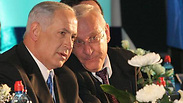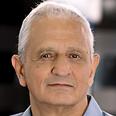
In the years that have passed since then, handkerchiefs have been replaced with tissues, but the president's authorities and the expectations from him have not changed. Prime Minister David Ben-Gurion's malice, which made him reduce his rival Weizmann's power to a minimum, fixed the status of the next nine presidents.
It's ironic that three of Ben-Gurion's associates – Yitzhak Ben-Zvi, Yitzhak Navon and Shimon Peres – succeeded in turning the President's residence into an active, influential, respectable and popular institution. The others were not as successful.
Our fourth president, Ephraim Katzir, had a hard time dealing with the public criticism against him. He was a scientist, not a politician. One day he invited Hanna Zemer, the editor-in-chief of the Davar newspaper, to join him on a tour. When they arrived at a school, the children gathered around him and started dancing. Katzir found no comfort in that. "They like me till the fourth grade," he sighed.
In the early 1990s, convenient circumstances were created for canceling the position. A new public movement demanded the establishment of a presidential regime in Israel. Like in the United States, France and several other countries, the head of the executive authority would be elected in direct elections and build whichever government he wants.
The original plan included canceling the existing presidency, but those who made the proposal depended on then-President Chaim Herzog's support, and therefore gave up on the option. The new law adopted in 1992 was a bad compromise between contradicting desires. Instead of strengthening the prime minister, it weakened him. In 2003, it was canceled.
'The state is me'
The presidency in its current format is like an additional piece of clothing in one's wardrobe: It's nice, but one can do without it. The authorities given to the president can be passed on to others. The Israeli democracy will withstand it.
But not the way Prime Minister Benjamin Netanyahu chose to do it. Netanyahu's colleagues in the Likud leadership say he is dreading the possibility that his party member Reuven (Rubi) Rivlin will win the presidential elections. He is "obsessed." Because he cannot prevent Rivlin from presenting his candidacy, he is pushing for the institution's cancelation.
He is that obsessed, that on the eve of his trip to Japan he removed Cabinet Secretary Avichai Mandelblit from the list of passengers and ordered him to stay in Israel and try to get a majority to support his proposal.
Rubi Rivlin is a worthy candidate. If Netanyahu thinks otherwise, it's his right to stand behind the screen at the Knesset and vote for a different candidate. He may also try to convince others to make the same decision. That's the stage. That's the game.
But he cannot mortgage government rules for his own personal aversions; he cannot disassemble institutions and change basic laws just because he can't control his urge; he can't stop a race in the middle just because he feels like it. Even Ben-Gurion didn't dare do it, and despite Netanyahu's seniority as prime minister, Ben-Gurion was still Ben-Gurion.
The Likud ministers and senior members understand that. The more they are pressured by Netanyahu, the less they obey him. But Netanyahu insists: The long inhabitance at the prime minister's residence, in an obsessive environment, filled with paranoia, have undermined his discretion.
He is not the first politician to be affected by "the state is me" syndrome. He will not be the first politician to discover, sooner or later, that he is wrong.
















